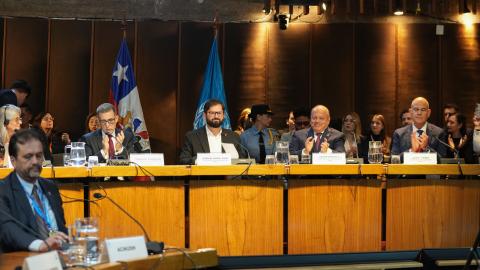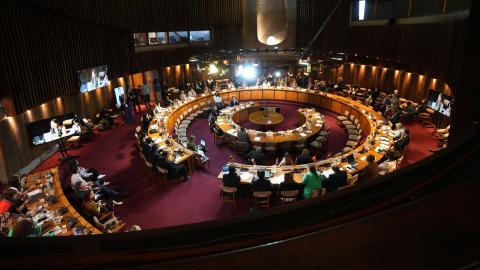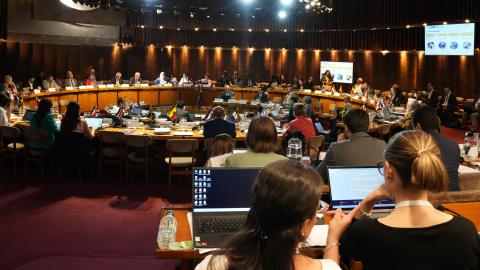Press Release
(January 29, 2015) The Presidency of the Republic of El Salvador and the Economic Commission for Latin America and the Caribbean (ECLAC) signed today a framework agreement for cooperation that seeks the institutional strengthening of that Central American state through activities related to research, training and technical assistance.
The agreement, which has a four-year time frame, was signed by Salvador Sánchez Cerén, President of El Salvador, and Alicia Bárcena, ECLAC’s Executive Secretary, in the context of the III Summit of the Community of Latin American and Caribbean States (CELAC), which is being held in Costa Rica.
“ECLAC is the institution that is most connected to the reality of our region,” said Sánchez Cerén, who expressed thanks for the work and continuous support given to his country by this United Nations organization. The President was accompanied at this event by the country’s Foreign Minister, Hugo Martínez.
The agreement, which is part of the technical assistance that the Commission offers to governments in the region, contemplates actions in the areas of production, finances, energy, climate change and social development.
ECLAC’s experts will collaborate on the strengthening of value chains and the country’s productive transformation; in the financial arena, they will work with development banks to achieve inclusive financing; with regard to public spending, they will seek to support the state’s transformation to boost development; and in the area of social protection and inclusion, they will take measures to benefit the population.
In addition, in the energy realm, the two sides agreed to work on diversifying the energy matrix and improving its efficiency and on the evaluation of energy self-sufficiency, as well as on sustainable development and climate change.
To achieve the agreement’s objectives, activities will include meetings of experts, training and dissemination, the exchange of experiences regarding public policy models, and the implementation of programs and research projects.
The authorities responsible for carrying out this agreement will be the Salvadoran Presidency’s Planning and Technical Secretary, Roberto Lorenzana, along with the Director of ECLAC’s Subregional Headquarters in Mexico, Hugo Beteta.
Meanwhile, the President of El Salvador presented ECLAC’s Executive Secretary with the Central American country’s Five-Year Development Plan 2014-2019, so that it could be incorporated into the Planning Repository that the regional United Nations organization launched recently through its Latin American and Caribbean Institute for Economic and Social Planning (ILPES).
The Planning Repository seeks to bring together all the region’s development plans in one place, facilitating comparisons between countries as well as the exchange of experiences and the sharing of good practices. In addition, it will serve as a point of reference so that state institutions can align public efforts with civil society and the private sector through the dissemination of information on overarching national goals.
During this presentation, Alicia Bárcena was accompanied by the Officer-in-Charge of the Commission’s Secretariat, Luis Yáñez; the Director of ECLAC’s Subregional Headquarters in Mexico, Hugo Beteta; and the Political Affairs Officer, Enrique Oviedo.



